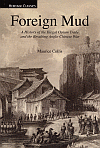French journalist Albert Londres (1884-1932) was one of the founders of investigative journalism. He travelled the World, writing about World affairs and looking into colonialism and international politics, as well as forced labor, drug trafficking and prostitution. One of his most interesting book, from Old Shanghai point of view, is 1925 “La Chine en folie”, relating his recent trip to China. As far as I know, it has never been translated in English.
Coming from Japan, Albert Londres started his trip in Beijing, telling the story of the unstable political situation of the time. He went on to interview northern warlord Tsang-Tso-Lin ( Zhang Zuolin / 張作霖). Staying at the Grand Hotel de Pékin, today the old wing of the Beijing Hotel, he encountered various characters including a Russian princess, three French mariners and his Chinese sidekick, Mr Pou, giving a really entertaining view of China at the time.
Most of the book takes place in Beijing and the North, but Albert Londres took a short trip to Shanghai. It is not clear how he went there, but he probably used the Peking Express train. Although he was amazed by the city, he clearly did not like it. “A free man cannot not talk about this city.”. “Some cities make guns, some make ham, Shanghai makes money.” He adds that in Shanghai the lingua franc is not English, but numbers for counting money.
“They all came! From New York, from Chicago, from Manchester, from London, from Lyon, from Hamburg, from Milan, from Amsterdam, from Barcelona, from Constantinople, from Tokyo, from Bagdad, all gentlemen and all wheeler-dealers ran to the promised land. Thus Shanghai was born, from a Chinese mother and a american-english-french-german-dutch-italian-japanese-jewish-spanish father.”
Visiting the Bund and the business district, he felt surrounded by banks. He then moves to Little Tokyo in Hongkou and ends up in the French Concession. “Here is the French Concession. The only one, as others are all together in International settlement. 200.000 Chinese live under our rules. It is run by a municipal council, just like Pontoise and Paris.” Gambling is, for him, the life of city. Londres ended up his journey at the Cercle sportif Français. Although the Shanghai part only counts a few pages, it gives a great impression of 1920s Shanghai.

Albert Londres came a second time to China in 1931, writing numerous articles about the political situation then. He toured China and French Indochina, researching the gigantic income made by the state opium trading company in the French colony of Indochina. He also looked in-depth into the deal between the French consulate and police in Shanghai, with the mafia controlling the opium trade. It is well believed that he was planning to publish a series of article or a book on those topic after coming back to France. He unexpectedly died in the sinking and fire of the Messagerie Maritime Ship MS Georges Philippar in the Arabian Sea, putting an end to this book’s publication.
Shanghailander articles are published on an irregular basis. To be notified when a new article is posted, subscribe to the newsletter using this link, or follow the Shanghailander Facebook page.


